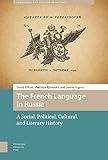The French language in Russia : a social, political, cultural, and literary history / Derek Offord, Vladislav Rjéoutski, Gesine Argent.
Material type: TextSeries: Languages and culture in history ; 8.Publisher: Amsterdam : Amsterdam University Press, [2018]Description: 1 online resource (699 pages) : illustrationsContent type:
TextSeries: Languages and culture in history ; 8.Publisher: Amsterdam : Amsterdam University Press, [2018]Description: 1 online resource (699 pages) : illustrationsContent type: - text
- computer
- online resource
- 9789048532766
- 9048532760
- French language -- Russia -- History -- 18th century
- French language -- Russia -- History -- 19th century
- Bilingualism -- Russia
- Français (Langue) -- Russie -- Histoire -- 18e siècle
- Français (Langue) -- Russie -- Histoire -- 19e siècle
- FOREIGN LANGUAGE STUDY -- French
- FOREIGN LANGUAGE STUDY -- General
- Bilingualism
- French language
- Russia
- 1700-1899
- 447.947 23
- PC3680.R8 O34 2018eb
| Item type | Home library | Collection | Call number | Materials specified | Status | Date due | Barcode | |
|---|---|---|---|---|---|---|---|---|
 Electronic-Books
Electronic-Books
|
OPJGU Sonepat- Campus | E-Books EBSCO | Available |
Includes bibliographical references (pages 589-660) and index.
The French Language in Russia' provides the fullest examination and discussion to date of the adoption of the French language by the elites of imperial Russia during the eighteenth and nineteenth centuries. It is interdisciplinary, approaching its subject from the angles of various kinds of history and historical sociolinguistics. Beyond its bearing on some of the grand narratives of Russian thought and literature, this book may afford more general insight into the social, political, cultural, and literary implications and effects of bilingualism in a speech community over a long period. It should also enlarge understanding of francophonie as a pan-European phenomenon. On the broadest plane, it has significance in an age of unprecedented global connectivity, for it invites us to look beyond the experience of a single nation and the social groups and individuals within it in order to discover how languages and the cultures and narratives associated with them have been shared across national boundaries.
Print version record.
Cover; Contents; List of illustrations; Preface; Acknowledgements; Presentation of dates, transliteration, and other editorial practices; Abbreviations used in the notes; The Romanovs; Introduction; Conventional assumptions about Franco-Russian bilingualism; Russia and 'the West', and the two Russias; Empire, nation, and language; Sociolinguistic perspectives; Methodological considerations; Literature as a primary source; Chapter 1. The historical contexts of Russian francophonie; The spread of French in seventeenth- and eighteenth-century Europe
The westernization of Russia in the eighteenth centuryThe introduction of foreign languages into eighteenth-century Russia; The golden age of the nobility; The Napoleonic Wars and the Decembrist Revolt; The literary community and the intelligentsia in the age of Nicholas I; Chapter 2. Teaching and learning French; An overview of French teaching in Russia; French versus German; French versus Latin; French (and English) versus Russian; Acquiring social and cultural codes by learning French; Chapter 3. French at court; The discovery of sociability
French as a sign of the status of the Russian courtFrench as a court language under Catherine II; French at the nineteenth-century court; French as a royal language; Chapter 4. French in high society; The place of French in the noble's linguistic repertoire; French in the sites of noble sociability; The spirit of the grand monde and social relations in it; Francophonie and social identity; French beyond the metropolitan aristocracy; Chapter 5. French in diplomacy and other official domains; The Chancery of Foreign Affairs and language training for Russian diplomats
The gradual rise of French in European and Russian treatiesTurning to French for the conduct of Russian diplomatic business; The influx of French loanwords into Russian diplomatic parlance; Language use in internal communications about foreign affairs; The triumph of French in the diplomatic community and the limits to its use; French and Russian in other official domains; French at the Academy of Sciences; Chapter 6. Writing French; Types of text and language choice in them; Language choice in nobles' personal correspondence; Language use in diaries, travel notes, memoirs, and albums
Writing French to join EuropeCount Rostopchin's 'memoirs'; Women's place in the literary landscape; Early nineteenth-century women's prose fiction; Chapter 7. French for cultural propaganda and political polemics; Transforming Russia's image; Cultural propaganda in French in the age of Catherine; Russian use of the Francophone press in the age of Catherine and beyond; The promotion and translation of Russian literature; Chaadaev's first 'Philosophical Letter'; Geopolitical polemics around 1848; Polemical writings in French after the Crimean War; Chapter 8. Language attitudes
eBooks on EBSCOhost EBSCO eBook Subscription Academic Collection - Worldwide
There are no comments on this title.

